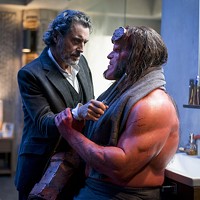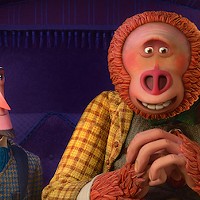

ACROSS THE UNIVERSE (2007). Fashioning a story around a catalogue of classic Beatles tunes, Across the Universe proves to be a magical mystery tour with the power to restore one's faith in both movies and music. One can nitpick about the thin plot, though it's sturdy enough to function as a support beam to director Julie Taymor's outlandish ideas. Taking place in the late 1960s, the story, credited to Taymor and the team of Dick Clement and Ian La Frenais (the blokes responsible for the smashing Irish R&B flick The Commitments), finds Liverpool laborer Jude (Jim Sturgess) traveling to America, whereupon he finds a best friend in college kid Max (Joe Anderson) and a lover in Max's kid sister Lucy (Evan Rachel Wood). Eventually, the three end up in New York, at which point Jude develops his passion for drawing, Max gets drafted into the army, and Lucy finds her political consciousness awakened. The movie takes great care to not only honor the music of The Beatles but also to pay tribute to other musical staples of the period, among them Janis Joplin, Jimi Hendrix, Creedence Clearwater Revival and even the Apple Records logo. Combining the song sampling technique of Moulin Rouge! with Forrest Gump's journey through the turbulent 1960s (and owing reams to Hair as well), Across the Universe serves up some truly staggering images, achieved through an eye-popping mix of computer graphics, oversized puppets and color-saturated set decorations. But while there's plenty of hallucinatory material, there's also plenty of heart, not to mention a handful of respectable covers of Fab Four tunes.
Extras in the two-disc DVD edition include audio commentary by Taymor and music producer/composer Elliot Goldenthal, a half-hour making-of feature, pieces on the music, choreography and visual effects, and eight extended musical performances.
Movie: ***1/2
Extras: ***1/2
ELIZABETH: THE GOLDEN AGE (2007). Sequels to movies like Saw and Daddy Day Care are givens, but a follow-up to an art-house endeavor set in a century far, far away? Indeed, that's the case with this sequel to the 1998 historical drama, Elizabeth. But like most sequels, E:TGA proves to be markedly inferior to its predecessor, which was a more original piece in that it examined the life of the Queen of England (played by Cate Blanchett) as she came into her own as both a woman and a ruler. With interesting characters flitting about in the shadows (most notably Geoffrey Rush's loyal but lethal advisor, Sir Francis Walsingham) and an unsettling sense of menace lurking around every corner, the first film deserved much of the lavish praise heaped upon it. By comparison, Elizabeth's second coming feels less like a royal offering than a common period biopic which mistakes stuffiness for stateliness. Here, Elizabeth must cope with an assassination plot approved by the jailed Mary Stuart (an effective Samantha Morton) and the King of Spain (ridiculous Jordi Molla). At the same time, she grows fond of the rakish explorer Sir Walter Raleigh (a coasting Clive Owen), leading to a romantic subplot nearly identical to the one already presented more zestfully by Bette Davis and Errol Flynn in 1939's The Private Lives of Elizabeth and Essex. Rush returns as Walsingham, but his role has been neutered and therefore his services are largely wasted. And while Blanchett delivers another fine performance as The Virgin Queen, she's ultimately defeated by a languorous script that makes court intrigue about as exciting as jury duty.
DVD extras include audio commentary by director Shekhar Kapur, eight deleted scenes, a look at staging the naval battles, and featurettes on the film's location shooting and production design.
Movie: **
Extras: **1/2
IN THE HEAT OF THE NIGHT (1967). That 1967 marked a turning point in motion picture history can be evidenced by merely glancing at the five films nominated that year for the Best Picture Oscar. On one hand, there was The Graduate and Bonnie and Clyde, two electrifying motion pictures that signaled a bold new direction in American cinema; on the other, there was Guess Who's Coming to Dinner and Doctor Dolittle, two badly dated embarrassments that tried (and failed) to retain Old Hollywood charm in a changing world. In hindsight, it's not surprising that the winner turned out to be In the Heat of the Night, which expertly straddled the line by relating an old-fashioned murder-mystery in a jazzy style. Sidney Poitier stars in his most iconic role as Virgil Tibbs, a Philadelphia detective who reluctantly agrees to help redneck sheriff Bill Gillespie (Rod Steiger) solve a crime in the racist town of Sparta, Mississippi. Despite constant threats to his well-being, Tibbs rarely loses his cool, navigating his way through a complicated case while suffering the slings and arrows of outrageous good ole boys. For his part, Gillespie begins to respect the northern cop, though director Norman Jewison and scripter Stirling Silliphant never betray any of the characters' ingrained prejudices by having these traits vanish into thin air. Warren Oates (as a deputy) and Lee Grant (as the victim's wife) are among those contributing indelible portrayals, while Quincy Jones provides a score that perfectly complements the flavorful atmosphere. Along with Best Picture, this also won Oscars for Best Actor (Steiger), Adapted Screenplay, Film Editing and Sound.
Tibbs' rapid-fire slapping of a racist community leader (Larry Gates) is a classic scene and warrants its own featurette on the new 40th Anniversary Collector's Edition DVD (well, 41st anniversary, but who's counting?). Other extras include audio commentary by Jewison, the late Steiger, Grant and cinematographer Haskell Wexler, a discussion of the film's importance in the 1960s, and a piece on Jones' score.
Movie: ***1/2
Extras: ***


